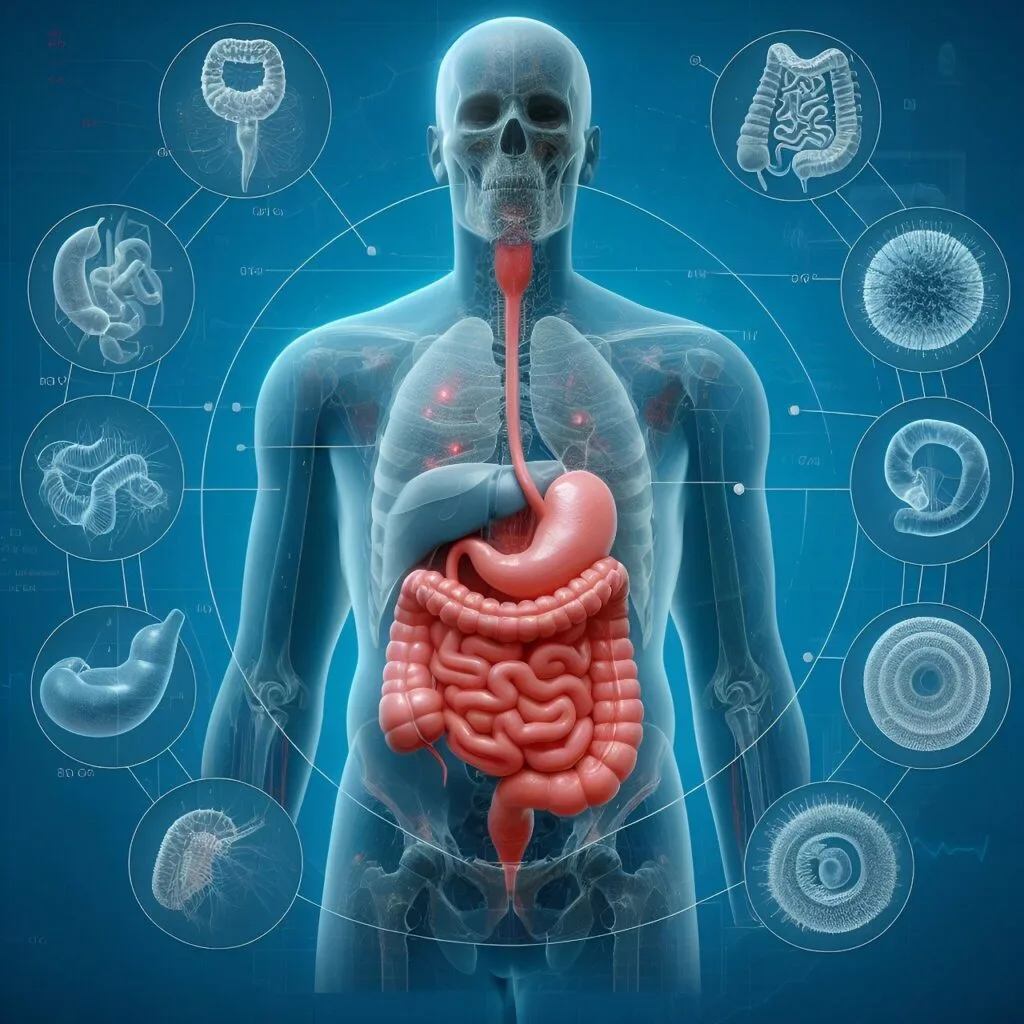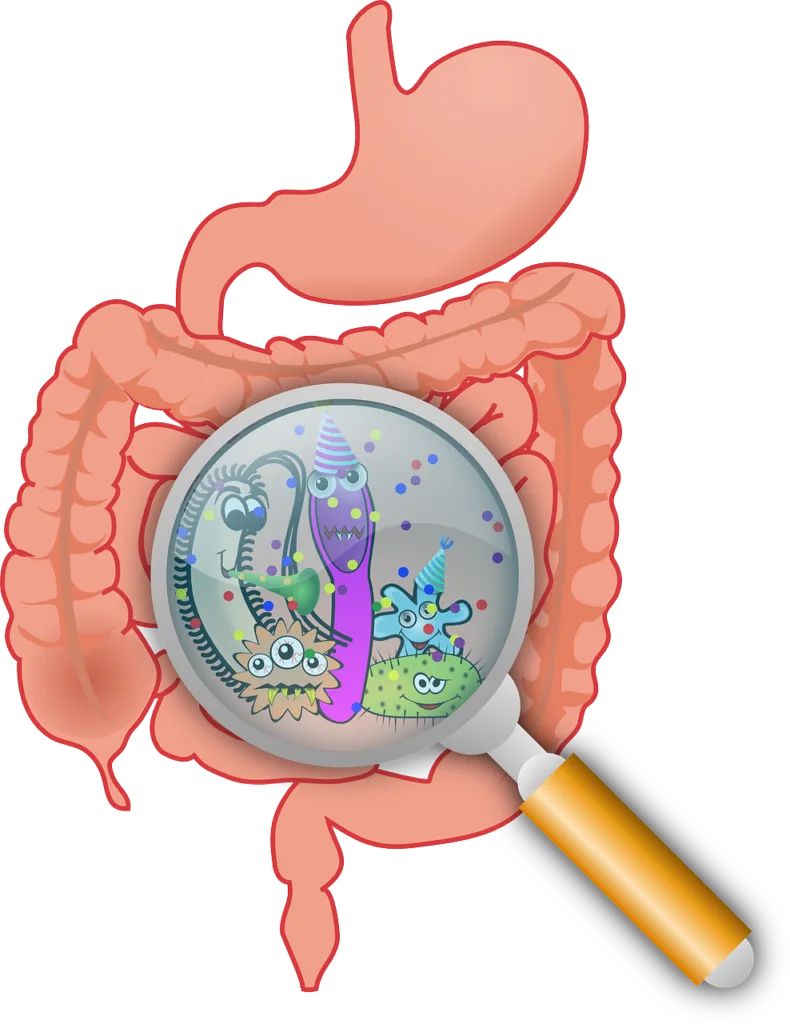Why Your Digestive Health Matters More Than You Think

Introduction
A. The Importance of Digestive Health
Despite being crucial to general wellbeing, digestive health is often ignored until issues occur. Your digestive system’s health can be greatly impacted by conditions like irritable bowel syndrome (IBS) or more persistent problems like occasional upset stomach. However, why is gut health so crucial, and what steps can you take to keep it that way? Let’s examine the fundamentals of maintaining the healthiest possible digestive tract.
B. Connection Between Digestive Health and Overall Well-being
Beyond only breaking down food, the digestive system is essential to your general well-being. The proper absorption of nutrients by your body is contingent upon a functional digestive system. Furthermore, studies show a strong connection between mental health and gut health, commonly known as the connection between the gut and the brain. Sustaining optimal intestinal well-being can lower inflammation, strengthen immunity, and even elevate mood.
C. Common Misconceptions About Digestive Health
There are a lot of misconceptions about gut health. For example, a lot of people think that heartburn is only brought on by too much stomach acid, but there are really a number of other possible causes, such as problems with the LES. Another myth is that missing meals will give your digestive system a “break,” but irregular eating schedules can actually cause problems with digestion. To properly control the health of your digestive system, you must be able to distinguish fact from fantasy.
How the Digestive System Functions
A. Breakdown of Food
The digestive system breaks down food into nutrients that the body can use. This process involves mechanical digestion (chewing and stomach churning) and chemical digestion (enzymes and acids breaking down food molecules).
B. Absorption of Nutrients
Once food is broken down, nutrients are absorbed in the small intestine. The walls of the small intestine are lined with villi, tiny finger-like structures that increase the surface area for absorption. Nutrients then enter the bloodstream and are transported to cells throughout the body.
C. Waste Elimination
What remains after the nutrients are absorbed is waste, which moves into the large intestine. Here, water is absorbed, and the remaining material is formed into stool, which is eventually expelled from the body
Factors Affecting Digestive Health
A. Diet and Nutrition
Your diet has a profound impact on your digestive health.
1. Impact of Fiber
Fiber is essential for a healthy digestive system. It helps regulate bowel movements, prevents constipation, and can even reduce the risk of digestive disorders like diverticulitis. Foods rich in fiber include fruits, vegetables, whole grains, and legumes.
2. The Role of Probiotics and Prebiotics
Probiotics are live bacteria that can benefit your gut health, while prebiotics are types of fiber that feed the good bacteria in your gut. Including foods like yogurt, kefir, sauerkraut, and other fermented products in your diet can help maintain a healthy balance of gut bacteria.
B. Hydration and Its Effect on Digestion
Staying hydrated is crucial for digestion. Water helps break down food so your body can absorb the nutrients. It also keeps the stool soft and easy to pass, preventing constipation.
C. The Influence of Stress on Digestion
Stress can wreak havoc on your digestive system. It can lead to conditions like IBS, exacerbate symptoms of heartburn, and slow down or speed up the digestive process. Managing stress through mindfulness, exercise, and relaxation techniques can greatly benefit your digestive health.
D. Impact of Medications on Digestive Health
Certain medications can affect your digestive health. For instance, nonsteroidal anti-inflammatory drugs (NSAIDs) can irritate the stomach lining, leading to ulcers. Antibiotics can disrupt the balance of good bacteria in your gut, leading to digestive issues like diarrhea. Always consult your doctor about potential side effects and how to manage them.
Understanding and Improving Digestive Health
A vital component of total wellbeing, digestive health affects not just physical health but also mental and emotional well-being. A healthy digestive system keeps illnesses and discomfort at bay while ensuring that your body gets the nutrition it needs. This book will cover common digestive diseases, symptoms of poor digestive health, the impact of digestive health on other body systems, and methods for keeping the digestive system in good working order.
A. Common Digestive Disorders
- Gastroesophageal Reflux Disease (GERD)
The chronic illness known as gastroesophageal reflux disease (GERD) is characterized by frequent reflux of stomach acid into the esophagus, which can be irritating and uncomfortable. Heartburn, regurgitation, and trouble swallowing are among the symptoms. In addition to taking drugs like proton pump inhibitors and antacids, managing GERD can also involve making lifestyle modifications like avoiding trigger foods, eating smaller meals, and sleeping with the head up.
- Irritable Bowel Syndrome (IBS)
Irritable Bowel Syndrome (IBS) is a common disorder that affects the large intestine. Symptoms include cramping, abdominal pain, bloating, gas, and changes in bowel habits, such as diarrhea or constipation. The exact cause of IBS is unknown, but it’s believed to be linked to a combination of gut sensitivity, stress, and diet. Managing IBS often involves dietary changes, stress management, and medications to relieve symptoms.
- Inflammatory Bowel Disease (IBD)
Inflammatory Bowel Disease (IBD) refers to chronic inflammatory conditions of the gastrointestinal tract, including Crohn’s disease and ulcerative colitis. Symptoms can include severe diarrhea, fatigue, weight loss, and abdominal pain. IBD is a serious condition that requires medical treatment, which may include anti-inflammatory drugs, immune system suppressors, and sometimes surgery.
- Food Intolerances and Allergies
Food intolerances, including those caused by lactose or gluten, happen when the digestive tract cannot adequately process a particular food. On the other hand, allergies are caused by the body’s immune system responding to particular proteins found in food. Food allergies and intolerances can cause symptoms that range from minor discomforts like gas and bloating to severe reactions like anaphylaxis in the case of an allergy. Identifying and avoiding foods that provoke these disorders is essential to their management.
- Constipation and Diarrhea
Common digestive problems like diarrhea and constipation can be signs of a number of underlying illnesses. Frequent bowel movements and trouble passing stool are the hallmarks of constipation, which is frequently brought on by dehydration, low fiber intake, or certain drugs. In contrast, diarrhea is characterized by frequent, loose, or watery stools and can be brought on by illnesses, food allergies, or digestive issues. Nutritional changes, plenty of water, and occasionally medication can help manage both illnesses.

B. Signs of Poor Digestive Health
- Bloating and Gas
Bloating and excessive gas are common signs of digestive distress. They often result from eating certain foods, swallowing air while eating, or underlying conditions like IBS. Persistent bloating and gas may indicate an imbalance in gut bacteria or food intolerances.
- Adominal Pain and Discomfort
Abdominal pain or discomfort, particularly after eating, can be a sign of digestive problems. This pain can vary from mild to severe and may be caused by conditions such as GERD, IBS, or IBD. It’s important to monitor these symptoms and seek medical advice if they persist
- Irregular Bowel Movements
Changes in bowel habits, such as constipation or diarrhea, can be indicators of poor digestive health. Regular bowel movements are crucial for eliminating waste and toxins from the body, and irregularities can signal digestive disorders or other health issues.
- Unexplained Weight Loss or Gain
Unexpected weight loss or gain can be a sign of digestive problems. Difficulty absorbing nutrients due to conditions like IBD or malabsorption syndromes can lead to weight loss, while issues like bloating or water retention might cause weight gain.
- Fatigue and Lethargy
Chronic fatigue and lethargy can result from poor digestive health. When the body is not properly absorbing nutrients or is constantly fighting inflammation, it can lead to feelings of exhaustion and low energy

How Poor Digestive Health Affects Other Systems in the Body
A. Immune System Connection
The gut contains a sizable percentage of the immune system. The immune system can be weakened by poor gut health, leaving the body more vulnerable to diseases and infections. A strong immune system is supported by a healthy stomach, which aids in the body’s defense.
B. Mental Health Implications
The digestive system and the brain are connected by a sophisticated communication network known as the “gut-brain axis.” Anxiety, melancholy, and mood swings are among the signs of poor gut health that can have an influence on mental health. Stress and anxiety levels that are elevated are frequently linked to conditions such as IBS.
C. Skin Health and Appearance
Digestive health also plays a role in skin health. Issues like acne, eczema, and rosacea can be exacerbated by poor gut health. An unhealthy digestive system can lead to inflammation that manifests in the skin, contributing to various dermatological conditions.
D. Hormonal Imbalances
The gut is involved in the production and regulation of certain hormones. Poor digestive health can disrupt hormonal balance, leading to issues such as irregular menstrual cycles, mood swings, and weight fluctuations.
Strategies for Improving Digestive Health
A. Adopting a Balanced Diet
- 1. Foods to Include
Incorporating a variety of nutrient-dense foods is crucial for digestive health. Include plenty of fiber-rich foods such as fruits, vegetables, whole grains, and legumes. Fermented foods like yogurt, kefir, and sauerkraut are also beneficial for gut health due to their probiotic content.
- 2. Foods to Avoid
Avoiding certain foods can help improve digestive health. Processed foods, high-fat foods, and foods high in refined sugars can contribute to digestive issues. Additionally, individuals with food intolerances or allergies should avoid their trigger foods to prevent symptoms.
B. Regular Exercise and Its Benefits
Regular physical activity is beneficial for digestive health. Exercise helps stimulate intestinal contractions, promoting regular bowel movements. It also reduces stress, which can negatively impact digestion.
C. Managing Stress Levels
- 1. Relaxation Techniques
Practicing relaxation techniques such as deep breathing, meditation, and yoga can help reduce stress levels, which in turn can improve digestive health. Stress management is key to preventing conditions like IBS and GERD.
- 2. Importance of Sleep
Adequate sleep is essential for overall health, including digestive health. Poor sleep patterns can disrupt the gut microbiome and contribute to digestive problems. Aim for 7-9 hours of quality sleep per night.
D. Staying Hydrated
Hydration is crucial for maintaining a healthy digestive system. Water helps break down food, facilitates nutrient absorption, and keeps the digestive tract functioning smoothly. Aim to drink at least 8 glasses of water a day, more if you’re physically active or live in a hot climate.
E. Use of Probiotics and Supplements
Supplements and probiotics may help to keep the gut healthy. Probiotics help the gut grow good bacteria, and digestive health can be supported by supplements that contain fiber, digestive enzymes, and omega-3 fatty acids. A healthcare professional should always be consulted before beginning any new supplement regimen.

The Role of Gut Microbiota
A. What is Gut Microbiota?
Gut microbiota refers to the trillions of microorganisms, including bacteria, viruses, and fungi, that live in the digestive tract. These microorganisms play a crucial role in digestion, immune function, and overall health.
B. How Gut Bacteria Affect Digestion
The bacteria in the gut aid in vitamin synthesis, food digestion, and pathogen defense. Dysbiosis, or an imbalance in gut flora, can cause digestive issues as well as diseases like IBS, obesity, and even mental health issues.
C. Maintaining a Healthy Gut Microbiome
Eating a varied diet high in fiber and fermented foods, drinking plenty of water, controlling stress, and avoiding needless antibiotics—which can upset the delicate balance of gut bacteria—are all important for maintaining a healthy gut microbiome

The Impact of Lifestyle Choices on Digestive Health
A. Smoking and Alcohol Consumption
Smoking and excessive alcohol consumption can negatively impact digestive health. Smoking increases the risk of conditions like GERD and peptic ulcers, while alcohol can irritate the digestive tract and lead to inflammation.
B. Sedentary Lifestyle vs. Active Living
A sedentary lifestyle can slow down the digestive process, leading to issues like constipation and bloating. On the other hand, regular physical activity promotes healthy digestion by keeping the digestive system moving.
C. The Effect of Sleep Patterns on Digestion
Irregular sleep patterns can disrupt the digestive process and contribute to problems like acid reflux and indigestion. Establishing a regular sleep routine and ensuring adequate rest can improve digestive health.


2 thoughts on “DIgestive Health”